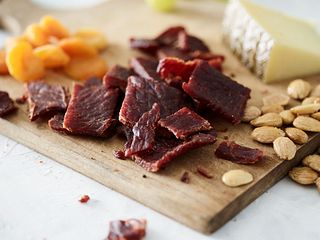Four Ladies, A Farmer and A Farmer's Market
Mike Holden has a strong passion for Maine-Anjou, "the kind that actually perform", and marketing beef direct-to-consumer. He's a tenured member of the Iowa Beef Industry Council board and has developed a strong interest in international trade through his involvement with the U.S. Meat Export Federation.
Mike Holden is a third-generation farmer that raises corn, and soybeans and maintains a Maine x Angus herd to support their direct-to-consumer beef business. He has served on beef industry boards for decades, joining the Iowa Beef Industry Council board in 2005.
Mike’s experiences marketing beef direct-to-consumer continue to open his eyes to the opportunities to change the conversation around beef with consumers. Mike mentioned, “As producers we are sometimes hesitant to engage with consumers for fear that we will get criticized or have this opinion that consumers are set in their ways. That hasn’t been my experience at all. I’ve learned people are really interested to know where their food comes from. The pandemic taught us that. People are eager to learn where their food comes from.”
On the flip side, Mike discusses how he thinks international trade can complement domestic beef demand driving activities. He shares how his experiences personally and with the Beef Checkoff have evolved his understanding of the consumer marketplace.
Four Ladies, a Farmer and A Farmer’s Market
Mike has attended his fair share of farmer’s markets to seek out new customers. He views these events as an opportunity to have an open conversation with consumers about their concerns in the beef industry. One particular Saturday, Holden was approached by four ladies with questions about antibiotic-free beef.
“So your beef is antibiotic-free?”
Mike: “These cattle are. However, we’ve changed our promotions and labeling to only as-needed antibiotic use. I must ask, do you go on vacation?”
“Well, sure!”
Mike: “And what happens? People typically get sick from being exposed to germs they’re not familiar with. Same thing with cattle. So do you go to the doctor when you get sick?”
“Yes, if it’s bad enough.”
Mike: “So you take antibiotics for the prescribed amount of time. Same thing with my cattle or anyone else. This supports a better product and a more humane environment for the animals. We have drug use protocols and we follow those protocols which in turn protects consumers and the animals.”
At the start, the four ladies were against antibiotic use. They were fearful of antibiotic residue in the meat. According to Mike, “After we talked about that, they said, you know, you’ve changed my mind. I’m still concerned but not as worried now because I now better understand why you do what you do.”
Importance of US Meat Export Federation (USMEF)
Alternatively, Mike knows the demand for beef stretches far beyond his local community farmer’s market.
“I don’t know if there is another way we could best spend money rather than helping USMEF export US beef.”
Beef exports in recent years have accounted for as high as 26% of the carcass value. “That doesn’t just happen, that came from your dollars, whether you’re a cow-calf person, you’re a feedlot, whatever you are, USMEF contributes to the market demand,” Mike commented.
The US has a strong demand for ground beef destined for feed service. Importing beef helps make lean products affordable while simultaneously allowing the US to derive more value per carcass by exporting higher-value cuts to foreign trade partners. Mike went on to share, “We are a global economy. If we have any chance at having peace in the world, we have to keep the people fed, and doing business with other countries is a part of that.”
Mike's Encouragement to Iowa Beef Producers
Holden has served on the USMEF board and shares a strong passion for discussing how international marketing contributes to the return on investment for beef producers. Additionally, he currently serves as a representative on the Cattlemen’s Beef Board representing Iowa beef producers.
“We have to continue to show them where the value of the Beef Checkoff comes from. I don’t even want to think about what promotion and markets would look like in the absence of the Beef Checkoff. People are visual and want to see that value and that’s ok. That’s why I use the percentage of carcass value for exports which is clearly driven by Beef Checkoff dollars through USMEF.”
Mike’s call to action for producers is to get involved. It could be a simple conversation at a local farmer's market with a shopper and end up half way across the world. Starting locally is a great place to start small and have a local impact. He encourages producers to call the IBIC office and talk to staff. “I thought I knew quite a little about the Beef Checkoff but once I got on, I learned that I was only seeing the tip of the iceberg.”
The Beef Checkoff continues to work strategically to serve customers at home and internationally to drive beef demand and ultimately create product disappearance. These are you Beef Checkoff dollars at work. To learn more about becoming involved in the Iowa Beef Industry Council visit iabeef.org.

Share This Page